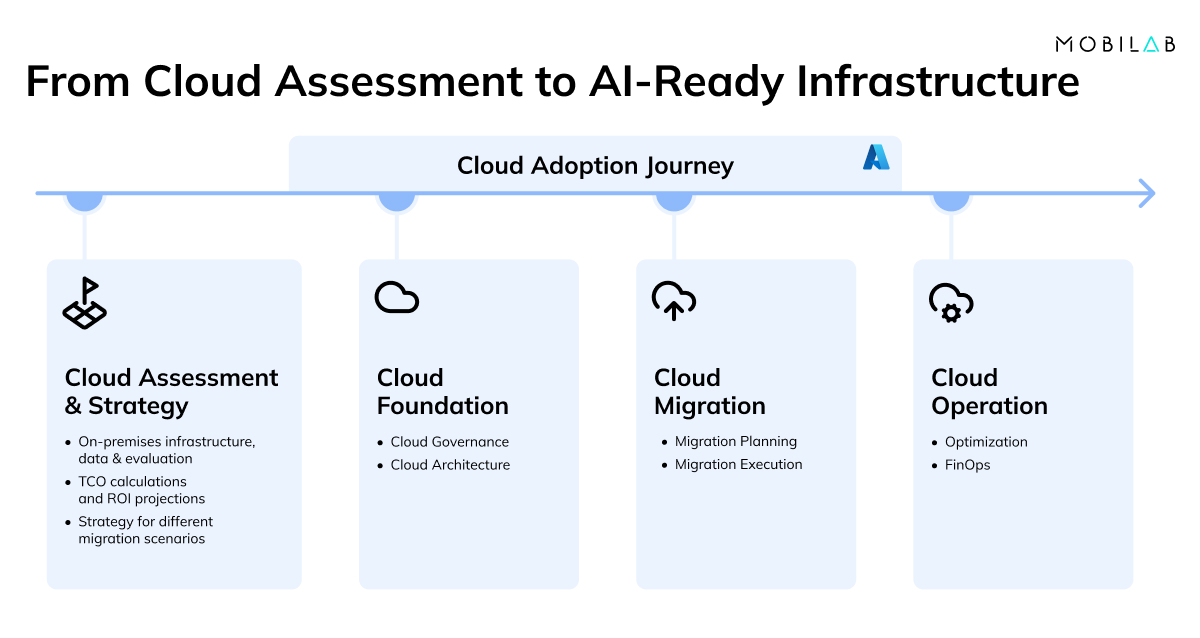When businesses consider Cloud migration, the spotlight often falls on tools, timelines, or technologies – along with the question: How much can we reduce our IT infrastructure costs? However, clarity in operation and financial impact during the assessment stage is crucial for the success of the transformation.
At MobiLab, our experience shows that a well-executed Cloud assessment is a strategic enabler for technological innovation, and AI-driven future initiatives. It plays a critical role in establishing measurable KPIs and aligning migration plans with long-term outcomes. It allows us clarify future cost, performance, availability, and build governance targets after the migration, enabling our clients to meet their business and operational goals.
Without a comprehensive assessment, organizations risk strategies built on assumptions about their on-premises IT landscape instead of evidence-backed decision-making.
Why Cloud Assessments Are Central to Cloud Adoption Strategy
A Cloud Assessment penetrates complex IT infrastructure data and translates it into clear, actionable insights that help business leaders make smarter decisions around total cost of ownership (TCO), and operations, and strategic priorities. The assessment defines technical baselines, identifies cost levers, uncovers operational risks, and establishes metrics that will later serve as proof of value.
A structured Cloud assessment gives decision-makers the evidence they need to confidently plan and execute a Cloud migration. It provides clarity on:
- Current infrastructure and workloads deployed
- System performance, inefficiencies, and cost drivers
- Migration priorities based on business and technical needs
- KPIs that guide decisions and validate results
- Security and compliance requirements
- The true TCO and ROI projections based on real, organization-specific data
Establishing clarity on the above aspects allow Cloud strategies to be grounded in business reality instead of just technical specifications. Using real data to perform a comprehensive infrastructure analysis on the entire landscape ensures that every decision is backed by measurable insight and tangible results.
The Business Value of Migrating and Modernizing to Microsoft Azure
391%
three-year return on investment (ROI)
53%
more efficient IT infrastructure teams
87%
faster deployment of IT resources
86%
less unplanned downtime
Source: IDC Custom Solutions, The Business Value of Migrating and Modernizing to Microsoft Azure, Whitepaper
MobiLab’s KPI-Driven Cloud Assessment Framework
Our assessment methodology begins with a core principle: define the metrics and KPI first and structure the right Cloud strategy around them.
We use a three-phase model to deliver a comprehensive and validated Cloud readiness strategy.
Phase 1: Foundation
This stage captures a detailed view of the current environment:
- Infrastructure layout and application footprint
- Budget and cost centers
- Performance targets and regulatory requirements
The goal is to align business context with technical scope and identify the conditions necessary for success.
Phase 2: Data Collection
We leverage automation within our data collection process to collect granular data on infrastructure usage and performance. This is integrated with:
- IT finance and capacity reports
- Operational feedback gathered from targeted workshops
MobiLab also specializes in uncovering critical dependencies within SAP and VMware-based environments. Our Cloud Assessment tooling is designed to analyze enterprise workloads where deeply embedded systems, legacy integration, and virtualized infrastructure could make a transition to the Cloud especially sensitive to overprovisioning, latency, or architectural drift.
Phase 3: Data Processing and KPI Modeling
Data collected in Phase 2 is validated, analyzed, and harmonized. We combine this with a proprietary benchmark library developed through real-world engagements across sectors, including finance, manufacturing, and logistics.
These benchmarks are drawn from our experiences and insights, reflecting what occurs in production environments, what works, what overruns, and what aligns with long-term KPIs.
Using these patterns, MobiLab is equipped to detect early-stage migration risks, flag misaligned expectations, and recommend mitigation paths with high confidence.
MobiLab also holds the Microsoft Advanced Specialization for SAP and VMware on Azure, validating our delivery standards for large-scale SAP environments or VMware environments.
Why KPIs Must Drive Your Cloud Adoption Strategy
A Cloud strategy should be guided by business outcomes, not just technical infrastructure choices. By calculating TCO and establishing KPIs during the assessment phase, we ensure that cost, performance, availability, and governance targets are hardwired into the defined migration roadmap.
Typical KPI categories include:
- Infrastructure cost per workload
- SLA adherence and system availability
- Deployment velocity and hardware refreshment cycles
These KPIs are integrated into operational Power BI dashboards to track performance post-migration and to inform continuous improvement initiatives.
Moving Right in the First Step of AI-Driven Cloud Integration
Each organization is unique in its application architecture, regulatory demands, and financial structures. A one-size-fits-all Cloud migration strategy is unlikely to succeed.
A structured Cloud assessment provides the foundation for moving with purpose. It reduces uncertainty, aligns stakeholders, and enables teams to make investment-grade decisions grounded in both data and experience.
At MobiLab, we built our successful Cloud Transformation track record, including SAP and VMware scenarios, powered by deep technical assessments and a consistent and results-backed methodology. Our KPI-based Cloud enablement process ensures that your AI-powered Cloud Adoption journey is executed with precision, secured, tied to strategic outcomes, and continuously measured against real business impact.

Ready to Evaluate Your Cloud Business Case?
Contact MobiLab today to discuss your Infrastructure needs and schedule a meeting to turn your vision into reality.